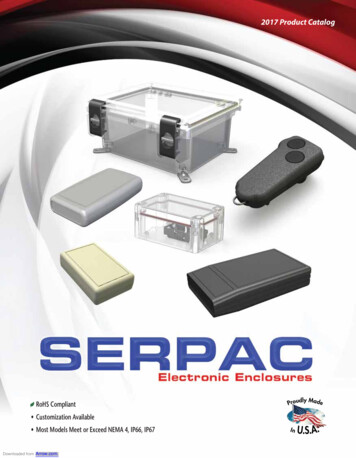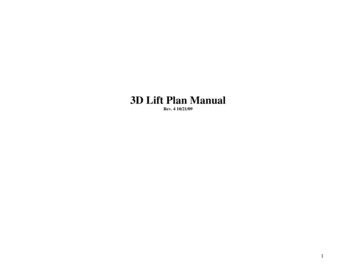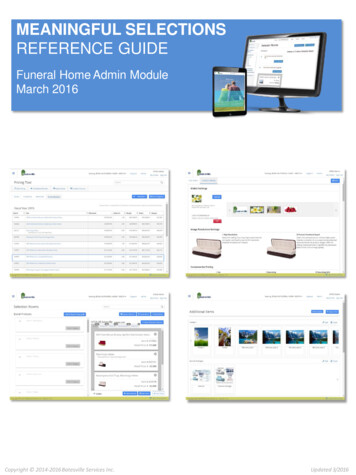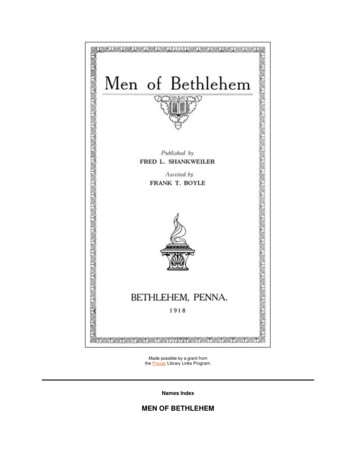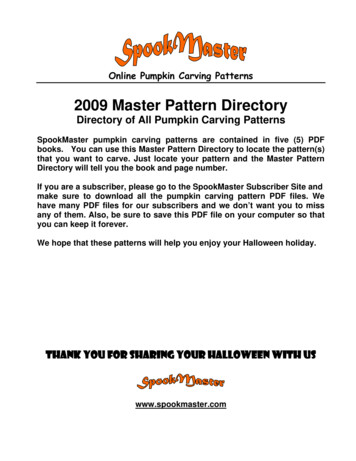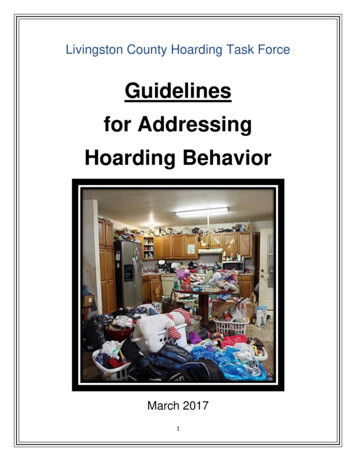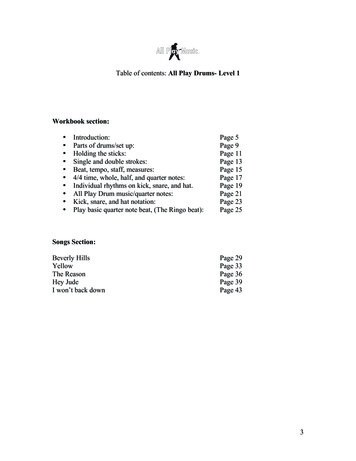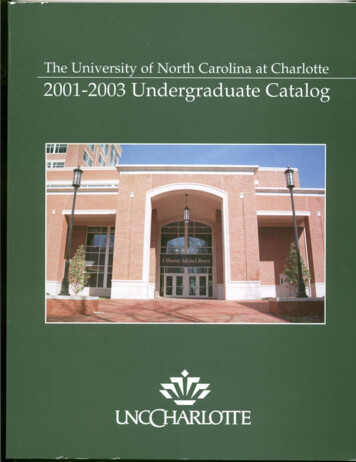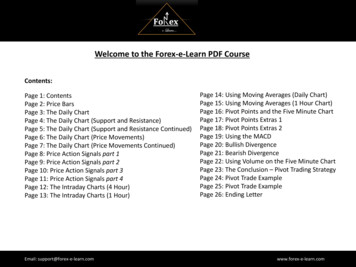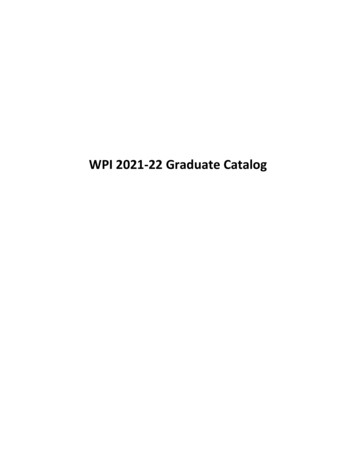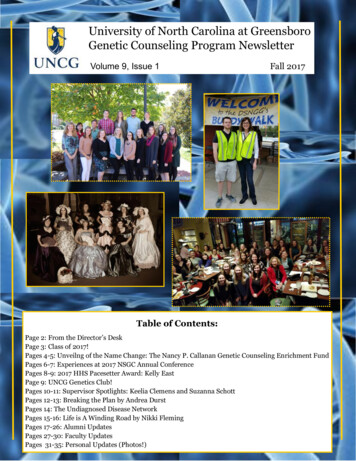
Transcription
Page 1University of North Carolina at GreensboroGenetic Counseling Program NewsletterVolume 9, Issue 1Fall 2017Table of Contents:Page 2: From the Director’s DeskPage 3: Class of 2017!Pages 4-5: Unveilng of the Name Change: The Nancy P. Callanan Genetic Counseling Enrichment FundPages 6-7: Experiences at 2017 NSGC Annual ConferencePages 8-9: 2017 HHS Pacesetter Award: Kelly EastPage 9: UNCG Genetics Club!Pages 10-11: Supervisor Spotlights: Keelia Clemens and Suzanna SchottPages 12-13: Breaking the Plan by Andrea DurstPages 14: The Undiagnosed Disease NetworkPages 15-16: Life is A Winding Road by Nikki FlemingPages 17-26: Alumni UpdatesPages 27-30: Faculty UpdatesPages 31-35: Personal Updates (Photos!)
Volume 9, Issue 1Page 2From The Director’s Desk:Lauren Doyle, MGC, CGCIt's hard to believe an entire year has gone by, and oh what a year ithas been! Whether it is the academic calendar or the beautiful NorthCarolina days that run into each other, the weeks have seeminglyevaporated and we are finding ourselves gearing up to celebrate allthe excitement, joys and new beginnings the new year brings.During a season full of reflection, I am feeling tremendous gratitude.I am grateful for the privilege of not only meeting but getting toknow many of you this year, through workshops, lectures, meetings, regional and national events. Iam thrilled to have been welcomed as a part of so many communities that serve our students, patients and families, and am grateful for the opportunity to witness the incredible work, talents anddedication of our vast alumni network. I feel incredible gratitude for our current students, who areleaning in wholeheartedly to the experiences in front of them, and for the team of caring, creativeprofessionals I have the honor of working with at UNCG every day. We are all honored by the timeand energy graciously given by the many genetic counselors, supervisors, physicians, researchers, educators and community members who contribute their talents to enrich our program in a multitudeof ways.I am excited to consider new initiatives and collaborations that will build upon the foundation of theprogram, and to continue to evolve our strategies to help hone skills and experiences for geneticcounselors in all fields in the future.With gratitude and enthusiasm (and to the best year yet!),Lauren
Page 3Volume 9, Issue 1CongratulationsClass of 2017!Class of 2017 Capstone Projects:Mariah Gleason:Assessing Genetic Counselor Knowledge about Psychiatric Disorders and Inclusion of Assessment for suchin the General Genetic Counseling Session**Courtney Heckman:Variability Among Clinical Genetics Professionals' Estimates of Complex Disease Risks Based on a Combination of Genetic and Environmental Factors*Lilli Howard:Angelman Syndrome Interdisciplinary Clinics: Parent Perspectives on Clinic EfficacyMary Hricik:Reanalysis of whole exome sequencing data from patients with retinal dystrophies to identify causal genevariants*Jaclyn Kotlarek:InformaSeq: LabCorp's experience and potential applications for clinical providersRuth Lehan:Burnout and Workplace Isolation in Laboratory Genetic Counselors*Maggie Powell:An Evaluation of Genetic Counselor's Usage of Tablet Computers and Mobile Medical Applications in ClinicLiz Mizerik:Hereditary diabetes referral and counseling practices in a prenatal setting**designates platform presentation at2017 NSGC Annual ConferenceLiz Mizerik with Capstone chair Rachel Mills (Classof 2008) at the UNCG Research andCreativity Expo in April 2017 (right) and shewas a finalist for a best poster award! (far right)
Page 4Unveiling of the Name Change:The Nancy P. Callanan Genetic CounselingEnrichment FundBy: Mercedes Zoeteman (Class of 2019)As of May 2017, the UNCG Student Enrichment Fund hasbeen renamed the “Nancy P. Callanan Genetic Counseling Enrichment Fund.” The fund has historically provided students withfinancial aid to support their professional development such astravel to the National Society of Genetic Counselors (NSGC)meeting, financial assistance for Capstone projects and bringingin outside speakers. The name change reflects the supportiveand compassionate nature of Nancy Callanan, the UNCG GeneticCounseling Program’s first program director and creator of thisfund. For these reasons, it was important to program alumni torecognize Nancy, who provided them with these opportunities. Inmy recent interview with Nancy, it was evident that her passionfor the field of genetic counseling is just as strong now as it everonce was, and the UNCG community is fortunate to have her as our Program Director Emeritus.Nancy graduated from the Sarah Lawrence Genetic Counseling Program in 1977 and beganher career as a pediatric genetic counselor. Reflecting on this, Nancy states that “in some ways, I feellike I grew up with genetic counseling.” She was never one of those individuals who had a 5 or 10year career plan; her career just unfolded. “First and foremost, I was a clinical genetic counselor. Butas I was in an academic medical center, I also had the opportunity to be involved in clinical researchand in teaching, primarily in the clinic but also some in the classroom. I was involved in planning forthe program and when the opportunity became available to apply to be the first program director I realized that maybe I had the skillset that would allow me to be good program director. It was a leap offaith, but it worked out.”Shortly after the development of the UNCG program, Nancy was quick to identify that as aprogram director, you also inherently add administrator to the job description. The student enrichmentfund was created on the basis that there was a lack of money in the budget to directly benefit students in ways that she thought were important. The purpose of the fund has always been about thestudents.For the future, Nancy hopes that this fund remains sustainable. “As the years go on and thereare an increasing number of graduates, I just hope that people continue to feel good about givingback to the program. I hope that as people progress in their careers that they can give back a littlemore. Broadly, I hope that all graduates see their place in the big picture of the profession and seeimportance of mentoring students and people who are new to the field, meeting with and encouragingstudents who are considering genetic counseling as a career.”As a result of her significant efforts to providing students with professional development opportunities, earlier this year it was revealed to Nancy by program alumni that the student enrichmentfund would be renamed in her honor. Commenting on the unveiling, Nancy states, “I was thrilled! Itseemed very thoughtful, very fitting, because I had started the fund and felt so strongly about it. Thealumni that pulled together to think about something to do to recognize my contributions to the program (and all alumni) are wonderful people. It felt like they put a lot of careful thought into what wouldbe a fitting recognition and I really appreciated that.” During this time, it was evident that the bond between program alumni and Nancy was one that is reflective of the core values of the UNCG GeneticCounseling Program that remains today.(See next page)
Page 5Unveiling of the Name Change (Continued)In addition to her significant contributions to the field of genetic counseling throughout her career, Nancy remains active within the profession after her retirement in 2016. “I finished out my termon the Board of Directors for the Accreditation Council for Genetic Counseling (ACGC) and I continueas a volunteer for that organization. I also plan to remain active in NSGC as a member of the Late Career SIG. I have worked with recent graduates on getting their capstone projects ready to submit forpublications. I have also been working with colleagues on updating the Facilitating the Genetic Counseling textbook. We hope the new edition will be out later this year.” While it is evident that she is stillpassionate about genetic counseling, Nancy remains humble and is ready to pass on the torch to thenew and incoming genetic counselors per se. As Nancy herself puts it, “It’s important for people likeme to get out of the way, and let them blossom and contribute the way I was able to do when I wasyounger. I always joke with people that I wanted to retire before I became a caricature of myself. Iwanted to retire when I felt at the top of my game and relevant, and quietly move onto other thingsand let other people move in. Yes, I am still contributing and plan to keep doing that, but with optimism I realize that there are so many new leaders that are doing great things for the profession.”Nancy generously shares guidance for incoming and graduating genetic counseling studentsas they embark upon their training and careers. She states that there will always be new challenges,new things to learn and new discoveries. She encourages students and new graduates to rememberthat genetic counselors are compassionate, genuine health care providers. The information and content regarding what we know and what we share with our patients is always critical. But the way wedo that in a very genuine and compassionate way, using the skills we have learned, is what makesgenetic counseling a unique profession. “So, I guess what I’m saying is don’t forget those counseling skills!” she emphasized.As for personal updates, Nancy happily states that “Roger and I have celebrated our 40th wedding anniversary with a cruise to the British Isles in September, which was lovely. We have loved having a less stressful lifestyle and now that we have more spare time we are getting engaged in ourcommunity in new ways. All is good! I look forward to hearing about your professional and personalupdates, and I encourage people not to hesitate to reach out by phone or email.”Overall, Nancy’s continued dedication to the field of genetic counseling and to the UNCG Genetic Counseling Program is still strong. Her desire to help students in the best way possible, her gratitude for donations to the Nancy P. Callanan Genetic Counseling Enrichment Fund, and the unwavering dedication to her students are a few small examples of the impact that she has had on the UNCGGenetic Counseling Program. The enrichment fund name change is just one way for us to say thankyou for all of your efforts, Nancy!If you would like to make a tax-deductible donation to the Nancy P. Callanan Genetic Counseling Enrichment Fund, you may do so online at http://gen.wp.uncg.edu/make-gift/. If you donate online,please select the “Other” designation and enter “Nancy P. Callanan Genetic Counseling EnrichmentFund”. You may also mail a check payable to the “Nancy P. Callanan Genetic Counseling Enrichment Fund directly to the program at:UNCG Genetic Counseling ProgramAttn: Marcia Griffin996 Spring Garden StreetGreensboro, NC 27412
Page 6Volume 9, Issue 1UNCG Genetic Counseling Program graduates and alumni stronglyrepresented at 2017 NSGC Annual Conference in Columbus, OHMary Hricik (Class of 2017), nowworking at LabCorp, presents herCapstone researchLiz Mizerik presented her researchat poster presentations as well asat Prenatal and Eduation SpecialInterest Group meetings at NSGCAlexandra Henshaw (Class of2015, right) and colleagueSamanthaBrovold(Class of2015)fromSequonompresentsher work(left)Ruth Lehan (right) with support of Capstonecommittee member Leah Williams (Class of2008)Mariah Gleason (Class of 2017, middle)with Capstone committee members Ashley Lowe (left) and Program Director Lauren Doyle (right). Mariah presented twoposters at the meeting!
Volume 9, Issue 1Page 7More fun in Columbus at NSGC!2017 Alumni ReunionCurrentstudentsmeetingalumnifromClassesof 2012and 2015(right)Linda Smith (2007),Holly Taylor (2010),Leah Williams (2008)and Rachel Mills(2008)The whole gang!Always classmates.Dinner with classmates and alumni
Volume 9, Issue 1Page 82017 HHS Alumni Association Pacesetter Award:Kelly East, MS, CGCThe HHS Pacesetter Award honors outstanding alumni of theschool who have attained local, state or regional recognitionthrough their achievements in scholarship, leadership or service,during their career, or through civic involvement. This year we areproud to announce that Kelly East is the recipient for the UNCGSchool of Health and Human Sciences Pacesetter award!Kelly received her Bachelor of Science degree in Microbiology fromAuburn University in 2007 and a Master of Science degree fromUNCG in 2010. Throughout her time at UNCG, it was evident thatshe had a distinct passion for genetics education and addressinglow level genetic literacy. She completed a Capstone Project entitled “Evaluations of Biotech 101: An Educational Outreach Programin Genetics and Biotechnology.” This study evaluated the effectiveness of an educational outreach course developed by HudsonAlphaInstitute for Biotechnology for the general public with the goal ofempowering the public to make more informed healthcare decisionsand participate fully in policy decisions relating to genetic information. Kelly was also a program graduate assistant where sheworked with the National Coordinating and Evaluation Center SickleCell Newborn Screening Initiative.Kelly worked at HudsonAlpha Institute for Biotechnology in 2008 prior to her matriculation into the GeneticCounseling Program. Shortly after graduation, she re-joined the team at HudsonAlpha as a practicinggenetic counselor and is still a member of the team today as the Clinical Applications Lead. Kelly states,“at HudsonAlpha, the genetic counseling team is involved in patient care and clinical research projects aswell as developing educational programs for clinical audiences. Genetic counselors are part of the Education Outreach department at HudsonAlpha; we work alongside expert educators that we can continue tolearn from. We become better teachers for the patients, research participants, and students that we interact with because we are able to watch and learn from the best”. Her job at HudsonAlpha is very rewardingto her, as it allows for the “opportunity to see the people we interact with have what we call ‘light bulb moments’ - when the things we talk about suddenly make sense and come alive. Whether it is high schoolstudents, teachers, healthcare providers, patients, or the general public, it is incredible to see people getexcited about genetics and understand how it can impact their life.”Through her work at HudsonAlpha as well as her personal interests, Kelly demonstrated a passion andinterest in the field of education within genetic counseling very early on. She recognized a need in our professional community and ultimately created the National Society of Genetic Counselors (NSGC) EducationSpecial Interest Group (SIG), serving as its first Chair in 2011-2012. “Prior to the start of the EducationSpecial Interest Group there was no organized place for genetic counselors who had primary interests andresponsibilities related to education to get to know one another, develop projects together and share resources” she states. The comradery that would come out of the Education SIG was a major factor in herdecision to start up the group, stating that “by bringing educationally minded genetic counselors together,we can share ideas and work together on projects that would not be possible to do on our own.”In true pacesetter fashion, Kelly gives back to the profession serving on the Abstract Working Group andis an Associate Member of the American College of Medical Genetics and Genomics. She has supportedthe establishment of a new genomic medicine clinic in Huntsville, Alabama and assumed the role of Genomic Counselor Lead for the Smith Family Clinic for Genomic Medicine in 2015.(See next page)
Volume 9, Issue 1Page 9Pacesetter Award (continued)Furthermore, Kelly provides instruction in and exposure to genetics and biotechnology to nursing students inthe University of Alabama Nursing School where she has Adjunct Faculty status. Kelly is also involved insupervising and mentoring genetic counseling students at the University of Alabama at Birmingham GeneticCounseling Program.Despite her many professional roles and commitments, Kelly has given back to the UNCG Genetic Counseling Program in various ways since her graduation. Given her passion for education and professional leadership in genetics education, Kelly has served as Capstone Committee member or chair for multiple graduatestudents in our program including students in the past three graduating classes; each of these students hasbeen successful in presenting their work on a national platform. Commenting on her mentoring approach,Kelly states that “I generally try to put myself in the student’s shoes and think about what they need at thatmoment to keep a project moving towards a high quality finished result. I try to remember what it was like tobe a student working on a Capstone project, what I was able to do easily, and what aspects of the projectthat I needed a little extra help and encouragement with.” Her open-mindedness, and willingness to beadaptable as a student mentor provides such an excellent foundation for current UNCG students, and herunwavering contributions within the program is outstanding! Kelly also took initiative in creating a unique,nationally competitive summer internship opportunity for genetic counseling graduate students at HudsonAlpha and serves as the coordinator and supervisor of the internship experience.Kelly has been a leader in education in the genetic counseling profession. Her passion for the developmentof competent healthcare providers and an informed public, leadership and expertise are exemplary and extend nationally. Reflecting on her time at UNCG, “Throughout my graduate training we were exposed to lotsof different specialties and roles genetic counselors can play - and never discouraged from thinking outsidethe box. We were also given ample opportunities to present information to our classmates and communitygroups and gain confidence in our education and public speaking skills. I am ever grateful for the education Ireceived at UNCG as well as the strong relationships that were built with program faculty and my fellowclassmates.” Kelly is a true role model and a shining star of the UNCG Genetic Counseling Program! Weare so proud and honored to present the HHS Pacesetter Award to Kelly East, and we cannot wait to seethe new ways that her passion for education will impact our students, patients and the profession!UNCG Genetics Club!I am excited to announce the beginning of the UNCGGenetics Club, which began its first official meetingsthis fall. This club has its origins in the Genetic Counseling Program, but the hope is that it will continuegrowing to include undergraduates and graduate students from around campus with varying backgrounds.This club was created by Lilli Howard (Class of 2017)with the purpose of encouraging interest and excitement in the field of genetics while bringing people together to discuss scientific and ethical genetic issues.In addition, we hope that this club will have a role inhelping prepare those wishing to pursue continued education in genetics and related sciences. This semester,we came together with UNCG students from manybackgrounds and interests to have discussions aboutCRISPR, direct to consumer testing, and public perceptions about genetics. We are excited for this group tocontinue growing and foster conversations about current hot topics in genetics, as well as hopefully invitingspeakers and enjoying social events.- Gretchen Rosso, Class of 2018President, UNCG Genetics Club
Page 10SUPERVISOR SPOTLIGHTKeelia Clemens, PhD, MS, CGCNominated By: Kayla Boggs, Class of 2016“Keelia Clemens is very deserving of recognition for beingan excellent supervisor! The night before I began my rotation, one of the other cancer genetic counselors at Dukegave birth. My first day was not supposed to be Keelia’sclinic day, but she came in anyway and saw patients andintroduced me to the rotation site. She made me feel welcome right away, which was very important to me, sincethis was my first experience in a cancer rotation. She encouraged me to jump in, flex new skills, try new resources,and develop my own style. I learned a great deal aboutchoosing the best genetic tests, exploring the psychosocialconcerns of patients with new cancer diagnoses, and muchmore. Because Duke Cancer was short-staffed, we wereinundated with patients and I was given many responsibilities. However, I was confident in myself and my abilities because Keelia was confident in me. While sometimesit is hard to forget your student status and start really considering yourself capable ofbeing a professional genetic counselor, Keelia made that easy for me! My great experiences at Duke Cancer with Keelia led to my ultimately becoming a cancer GC. Thankyou for everything, Keelia!”“I love being a part of the genetic counseling training program at UNCG. During my training, my supervisors played such an instrumental role in developing the genetic counselor I am today. Each of them had their own style forgenetic counseling and through them I was able to develop my own uniqueway of conveying information to patients. When I began my job search I washoping to land in a role at an academic center where I would have the opportunity to train future genetic counselors. My goal is to challenge students tostep out of their comfort zone and take charge of their cases from case prepto results disclosure. My hope is that after rotations in our clinic, students willfeel more confident in their abilities to function as independent genetic counselors. I also strongly feel my interactions with the trainees continue to makeme a better genetic counselor. Through their fresh eyes I discover additionalmethods for conveying genetic information and new approaches for trainingfuture students. I am honored to be featured in the supervisor spotlight andlook forward to many more years working with this program.”- Keelia
Volume 9, Issue 1Page 11SUPERVISOR SPOTLIGHTSuzanna Schott, MS, CGCNominated By: Mariah Gleason, Class of 2017“Suzanna was a phenomenal supervisor. She worked tirelesslyto make sure that my experiences with her helped to increasemy confidence and competence in genetic counseling. When apatient no-showed, she offered me the opportunity for a roleplay. When I felt less than confident about how a session went,she suggested that I write a detailed chart note for a secondchance at the session. She provided the most helpful feedbackand discussions about enriching my psychosocial counselingskills and challenged me to continue growing throughout therotation and my career. Despite her own busy caseload, shealways made time for me. The thoughtfulness and skills thatmake Suzanna a fantastic genetic counselor also make her afantastic supervisor.”“Working with genetic counseling interns is truly my favorite part of my job.Collaboration with students causes me to be more reflective about my ownpractice and stretches me in new directions. Whether keeping up with thelatest research, puzzling over how to explain a tricky concept, or working outan approach to a challenging psychosocial concern, the savvy and compassionate UNCG students keep me on my toes. Although supervising buildson fundamental genetic counseling skills, it is also its own art, and I am stilllearning ways to help students apply their strengths and develop their uniqueapproach. We genetic counselors have a tendency to be perfectionists, butworking with real people dealing with difficult medical issues can be verymessy. If I have a common goal for my students it is to help them go easieron themselves, recognize the power of core skills they already have like empathy and reflection, and embrace “mistakes” as learning opportunities.That’s my goal in my own practice too, and it is no exaggeration to say that Ilearn something new from every relationship with a student. I am so gratefulto have an opportunity to work with UNCG students, and it is truly gratifyingto be recognized as a supervisor. Thank you!”- Suzanna
Volume 9, Issue 1Page 12Breaking the PlanBy: Andrea L. Durst, MS, DrPH, LCGCLike many genetic counselors, I always had a plan.While my career has in part been the result of thiscareful planning, I have gotten to the place I am todayby learning to be flexible in moving from “Plan A” to“Plan at this point I have lost count”, following myevolving passions, and adjusting to life’s unexpectedturns.I entered into the genetic counseling program at UNCGin 2003 knowing that I eventually wanted to specializein cancer. While I was open to other experiences during my training, a cancer counseling position was stillat the top of my list when I began looking for positionsduring my second year. I was offered and accepted aposition to be the first genetic counselor at a hospital inLouisville, KY. Excited about the opportunity to start anew cancer genetic counseling clinic, I packed up therental car (a garbage truck had pretty much sliced oneside of my car in half during the graduation ceremony!) and headed for Louisville. That first year, Iworked hard to expand my fledgling clinic in both reach and staff size. Starting a genetic counseling service from the ground up was no easy task, and I didn’t always know the best way to proceed with this effort. However, I had wonderful resources including several of my classmates whohad also taken jobs starting new clinics—we held regular conference calls to compare strategies,ask questions, and offer support as we embarked on these journeys as new graduates.As my clinic grew in staff size, I successfully advocated for a promotion to Manager of GeneticCounseling Services. We began discussing the possibility of expanding genetic counseling at thehospital to other areas. This gave me a needed push to seriously think about the kind of skills thatI would need to successfully expand and manage the clinic that I had started. This led to my decision to return to school for my DrPH (Doctor of Public Health) in Health Management and Policy. Iquickly found that I loved being back in school and found the classes that I was taking in publichealth to be so relevant to programs that we were implementing in the clinic. During my doctorateprogram work, I tried to involve genetics as often as I could. But as my interest in public health genetics was flourishing, the plans to expand my genetic counseling clinic became less realistic. Mycareer was no longer following the well-laid plan that I had developed, and I was faced with a decision—do I move for a new job or stay and finish my degree?Ultimately, I decided to complete the last two years of my degree full time, even though I wasn’tquite sure how I would use it once I graduated. While not Plan A (or B or C), this decision resultedin so many opportunities to further my expertise in public health genetics that I could not have predicted when I made the extremely difficult decision to leave my genetic counseling position. I wassuddenly able to plan a practicum experience in Michigan with their Genomics and Genetic Disorders Section, which would lead to my participation on projects with the Region 4 Midwest GeneticsCollaborative, The Genetic Alliance, and the CDC. It was during this practicum in Michigan that(See next page)
Volume 9, Issue 1Page 13Breaking the Plan (continued)my mentor mentioned she had seen a position for Assistant Genetic Counseling ProgramDirector at Pitt, and thought that I would be a great fit given their strong connection to publichealth. I agreed, and even though I thought it was a long shot, I applied. (See next page)I have now been the Assistant Genetic Counseling Program Director at Pitt for just over twoyears, and I am thrilled with “Plan at this point I have lost track”. I love working with, teaching, and mentoring students as they complete their genetic counseling training. Witnessingand being a small part of their success is beyond rewarding. I have also been able to advance my work in public health genetics by serving as Co-Director of the MPH Program inPublic Health Genetics (one of two in the US), steering committee chair for NYMAC Regional Genetics Network, and co-chair of the NSGC Public Health SIG.While my career path has not always been a clear or easy one, I have certainly learned alot along the way. In my first position, I realized the importance of maintaining a goodwork/life balance. Though it is still sometimes difficult to make time for myself, I know that Iwill do my best work if I take time to recharge and to cultivate new and existing interestsand relationships. This is why I now try to stress the importance of self-care to my students.Sometimes, moving forward in my career and in life in general was about making a decision at a fork in the road, and other times it was about picking up the pieces of shatteredplans. One of the best pieces of advice I was given to manage both of these situations wasto stop worrying about making the absolute “right” decision and rather think about whether Iwas making a “good” decision (because, for example, neither finding a new job nor finishingmy degree full time were “wrong” decisions). I didn’t always know what those choiceswould lead to, but I trusted in my capacity to figure it out along the way, and was also fortunateto have a lot of support from the people in mylife—my family, friends, colleagues, and mentors—who supported me, cheered me on, andpushed me forward exactly when I needed it.I am excited for what the future of my career asa genetic counselor holds, but I no longer feel Ihave to plan for every minute of it!
Volume 9, Issue 1The Undiagnosed Disease NetworkThe Undiagnosed DiseaseNetwork (UDN) is a research study founded bythe National Institutes ofHealth in 2014 in an effortto bring together clinicaland research experts fromacross the United S
Overall, Nancy's continued dedication to the field of genetic counseling and to the UNCG Ge-netic Counseling Program is still strong. Her desire to help students in the best way possible, her grat-itude for donations to the Nancy P. Callanan Genetic Counseling Enrichment Fund, and the unwaver-ing dedication to her students are a few small .
